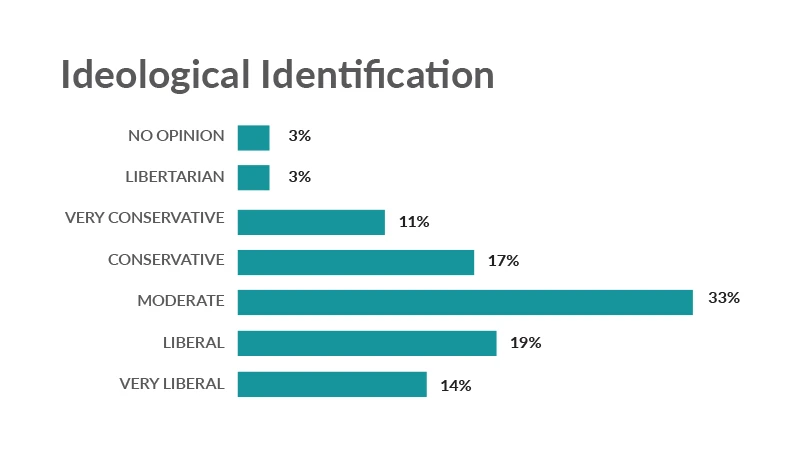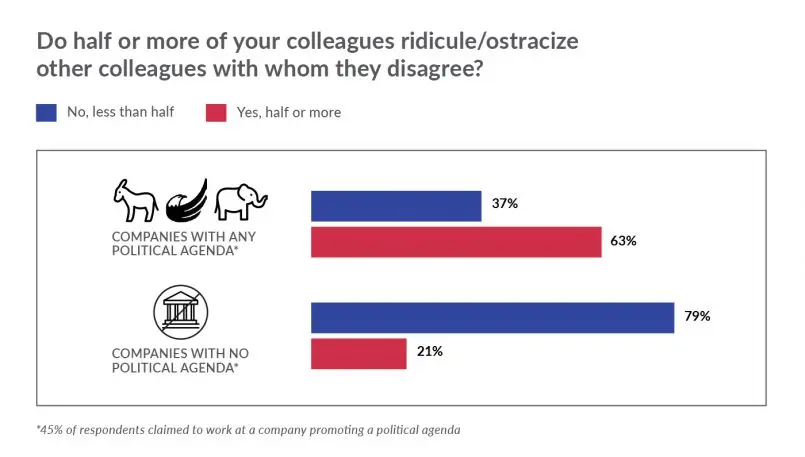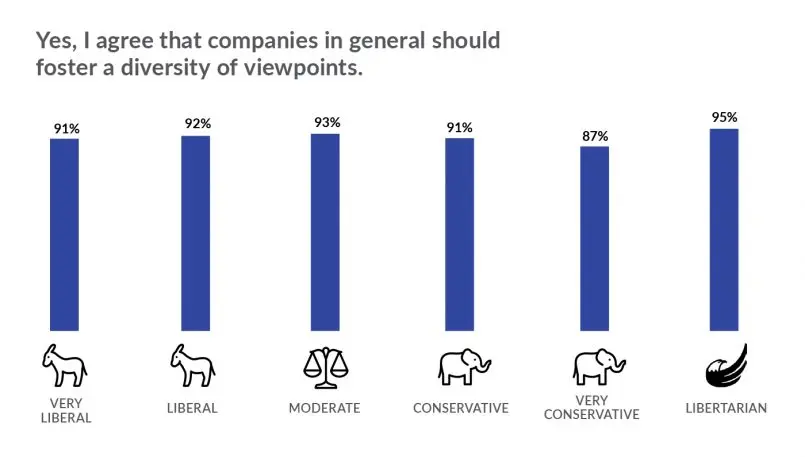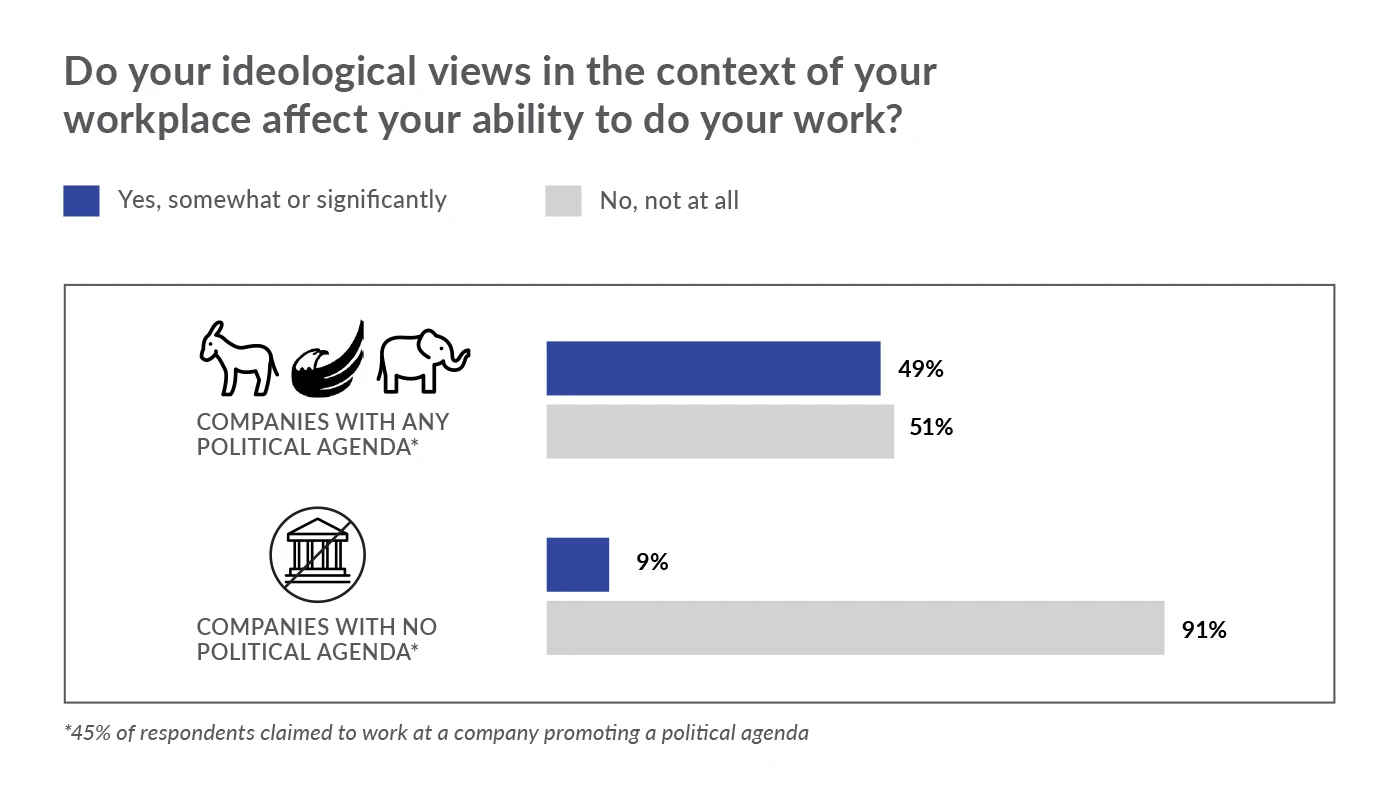Silicon Valley lends itself to political stereotypes–called overly progressive by conservatives and overly conservative by progressives. A new survey of 1,924 tech workers around the U.S. indicates that neither view is quite right but why both are so prominent.
In the poll of workers across the tech industry, conducted by survey company Morning Consult and commissioned by the conservative-leaning nonprofit Lincoln Network, about a quarter of respondents identified as having very strong views (14% left, 11% right). A third called themselves moderate, and equal shares (18% each) identified as mainstream liberal or conservative. Just 3% identified as libertarian, challenging a stereotype of tech bro culture.
Among those surveyed, 45% say that their company promotes a political agenda. That leaning tends to be toward the left, with 48% of respondents saying their company has a clear liberal agenda, as opposed to the 38% who reported a conservative agenda.

Nearly half of employees at companies with political agendas said their ideological views impacted their ability to work. At companies perceived to have a political agenda, 63% of workers said that ridicule in the workplace is commonplace if you disagree with a colleague, while only 21% said that happens at their apolitical companies.
Two thirds of participants worked at privately held tech companies, and a third at publicly traded ones. Among the biggest companies were Amazon, Apple, AT&T, Dell, Facebook, Google, Intel, Microsoft, Qualcomm, Salesforce, Samsung, and Twitter. Among those who took part, 84% worked in a technical role, 75% identified as male, and 49% were between 30 and 44 years old.

Related: How tech workers became activists, leading a resistance movement that is shaking up Silicon Valley
Lincoln also conducted an online survey of a few dozen tech workers to solicit opinions and anecdotes, similar to its contentious survey from 2017-2018. Some of those quotes pepper Lincoln’s report on the Morning Consult survey. “I am happy, with the exception of my time at work where I feel like the choices I have made in my beliefs label me as stupid, a bigot, deplored, and more . . . ” one anonymous tech worker wrote. “I am coming to the conclusion that we cannot live or work together any longer.”
In an op-ed for Fox News on Thursday, Johnson echoed his previous complaints about bias against conservatives in tech, saying the new data “confirm a stunning level of viewpoint intolerance in the tech community,” and “reveal an epidemic of polarization and intolerance in Silicon Valley and the broader tech community [that] presents an important opportunity for tech leadership to cultivate a culture of viewpoint inclusion.”
But I’ve also interviewed a handful or workers from major tech companies–on and off the record–over the past year, who have provided some insight on the results that are more nuanced than Johnson’s focus on bias. And when I spoke with a few survey respondents who agreed to an interview, I found their stories of discrimination less severe than appeared in the short comments gathered by Lincoln Network. Still, they do see their workplaces as much more friendly to colleagues who are openly left than even a bit conservative. (Workers spoke on condition of anonymity due to concern about backlash from colleagues.)

Perhaps no big company has a more contentious environment than Google, which brims with online forums for discussion and debate, including an internal social network and a meme generator. There is also a profusion of lightly moderated or un-moderated discussion lists where a few enthusiastic members post prodigiously, such as “politics,” “industryinfo,” and “eng-misc” (nicknamed “cringe-misc” by some).
James Damore, the erstwhile Google engineer who authored the highly controversial “Ideological Echo Chamber” memo that many saw as questioning the innate ability of women to be engineers, created a list called pc-harmful-discuss. The discussion group lived on after he was fired in August 2017, with no one in control, says a former Googler.
This dovetails with one fascinating finding in the survey. Overwhelming majorities of all political orientations–between 87% (very conservative) and 95% (libertarian) agreed that “companies in general should foster a diversity of viewpoints.” But groups with the strongest viewpoints also agreed most with the statement, “companies should terminate employees when they express offensive views outside the workplace.” (Emphasis added.) That was true for 52% of very conservative employees and 62% of very liberal employees in the survey.

“I and seven other Google employees were publicly blamed by individuals, such as Milo Yiannopoulos, for James Damore’s firing, and that resulted in death threats,” says Liz Fong-Jones, an 11-year Google employee who recently left the company. Fong-Jones is transgender, and was already a target of the anonymous online community Kiwi Farms, which specializes in trolling and defaming members of the trans community.
“That’s obviously very bad,” says a right-leaning Google engineer who opposed Damore’s firing, but agrees with Google’s progressives on some other issues. “[I am] appalled at the $90 million payout for Andy Rubin and all the sexual harassment going on with Google,” he says. Rubin received the payout when terminated for charges of sexual misconduct, part of a larger pattern among Google execs revealed in a 2018 New York Times exposé.
In addition, the engineer was against Project Dragonfly, a censored and monitored search product for the Chinese market, but not Project Maven, an AI contract with the U.S. military–also opposed by Google progressives. That left him with a dilemma: Opposition to Maven was mentioned in an employee petition against Dragonfly. “I really wanted to sign this petition, but Project Maven is why I didn’t,” he says.
Fears vs. repercussions
There are prominent cases of employees on the progressive side, such as Liz Fong-Jones, facing repercussions for their political or ideological speech–from fellow employees, and from management, based on voluminous reporting in Wired, Gizmodo, The Intercept, and others.
On the other side, I’ve spoken with many conservatives over the past year who fear retaliation from their progressive-leaning coworkers and management–be it firings, negative performance reviews, or other measures. But I’ve not found clear-cut cases to back up these fears. Often people say only that they know someone who is affected.
Secondhand accounts show up in the Lincoln Network/Morning Consult survey, too. At agenda-driven companies, very conservative people were most likely (48%) to agree with the statement: “I know someone who did not pursue or left a career in tech because of perceived ideological conflicts with their company.” (Very liberal was the second-highest group of employees who agreed, at 39%.)
Some participants in Lincoln’s Survey Monkey poll reported instances of people being fired or hired solely based on politics, but none were available or willing to speak with me. One who did talk told the story of a Microsoft employee who was harassed at work over her husband’s politics. When we discussed it, he explained, “I think it was more of an individual thing. I think there was one particularly rowdy person in general.”
That doesn’t mean there isn’t discrimination against conservatives in tech, but neither the survey nor my conversations have been able to pinpoint it. A question I’d love to see in a future survey is whether participants feel they have personally suffered repercussions for their views.
Management sets the tone
Another key divide is between those companies whose leadership jumps into the political and ideological fray and those that at least try to stay out. According to the Lincoln Network/Morning Consult survey, 91% of employees at companies that workers describe as nonpolitical feel they can work in peace. Whereas at companies that employees describe as promoting a political agenda, 49% of employees feel that their ideological views affect their ability to do their jobs.

Now it faces a likely bigger employee backlash over a contract to sell its HoloLens augmented reality headsets to the U.S. military. Opponents, known as Microsoft Workers 4 Good, report collecting hundreds of signatures in an open letter demanding the company cancel the contract and cease developing weapons technologies, among other measures.
It seems that conflicts like these will keep happening, but they may not tear a company apart. “I don’t think most people are looking to pick a fight at the professional level, in ways that would affect people’s careers over politics at Microsoft,” says the libertarian engineer. Leadership, he says, tries to stay out of employee debates, unless they blow up and “go viral.” Of course, sometimes they do.
Related: Meet the Silicon Valley socialists who are pushing a tech worker uprising
Even companies with strong political agendas at the top might be able to minimize conflict, however. Salesforce and its iconic cofounder and co-CEO Marc Benioff are undeniably political. Between them, Benioff and Salesforce contributed more than $7 million to a San Francisco ballot initiative, Proposition C, that aims to raise about $300 million per year through a new tax on large businesses in the company’s hometown. Benioff went to social media war with fellow billionaires who opposed the proposition, notably Square and Twitter CEO Jack Dorsey. That’s merely one example.
“We had a lot of pictures of Hillary Clinton on the walls,” says a Salesforce engineer who also identifies as libertarian. (That said, Salesforce also angered progressives by refusing to cancel a cloud-services contract with U.S. Customs and Border Protection.)
“Everybody knows what I’m into. I’m very outspoken on Facebook, but I try not to bring it to work,” he says.
Despite his philosophical differences with management, the engineer says he hasn’t felt any repercussions at work for his views. And he concedes that Salesforce leadership is trying to appear more welcoming to people with different political views and ideologies, especially as it has expanded in more conservative cities like Indianapolis. “I’ll give them a B-minus,” he says of the company’s effort.
Contact me confidentially with any news tips at seanjcaptain@gmail.com or Twitter DM @seancaptain. We can also set up a Signal call.
Recognize your brand’s excellence by applying to this year’s Brands That Matter Awards before the early-rate deadline, May 3.
